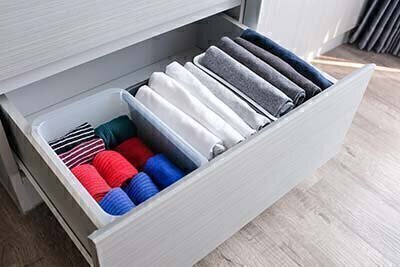Last updated February 2024
Need some help deciding what to cherish, what to sell, and what to pitch? Below are some popular strategies and resources.
For more advice and help, check out our sections on how to get rid of your unwanted stuff, clothing resale options, and estate sales.
 The KonMari Method
The KonMari Method
Japanese decluttering guru Marie Kondo sold millions of copies of her book The Life-Changing Magic of Tidying Up: The Japanese Art of Decluttering and Organizing, and won more fans with her calming Netflix series, Tidying Up With Marie Kondo. Her throw-it-all-out minimalist approach is based on the logic that, when you touch an object, it should spark joy. If it doesn’t, be the thing a spatula or a suit, you’re supposed to cull it. Obviously, her ultra-pared-back approach isn’t for everyone, especially book lovers who might take umbrage with Kondo’s suggestion that you tear pages from your favorite tomes to just “keep the words you like.”
The Home Edit
The latest craze in home organizing is to purge your stuff, then group what’s left by color in clear bins or out in the open. It’s a make-your-house-a-boutique aesthetic popularized by the business, Instagram account, and Netflix show (Get Organized with The Home Edit) of Nashville organizing gurus Clea Shearer and Joanna Teplin. There’s an undeniable appeal to how attractive this method makes ordinary stuff—say, a fridge bin of red condiments like ketchup, salsa, and strawberry jam. But those who aren’t tidy to begin with—or who hew toward dull-colored possessions—may find it annoying and hard to keep up.
The OHIO Rule
“Only Handle It Once” is a standard junk-battling refrain, perhaps best for controlling things constantly coming into your abode: mail, free grocery-store totes, cheap toys from kids’ birthday parties. You can also OHIO things you’re trying to sort out by deciding if you’ll keep something and then either sell, donate, or toss it. And no, you can’t run back to the dumpster to “rescue” things after you’ve made up your mind.
The One-Year Question
Haven’t worn that shirt, used Aunt Mildred’s teapot, or powered up your VHS player in over a year? Time to toss it. Can you hold on to a few things for sentimental reasons? Sure, but within reason. Keeping a couple of your late mother’s dolls is one thing, but letting a collection of 100 Barbies inhabit your valuable living space seems like a horror movie in the making.
Everything in Its Place or That Fits Your Space
Except for rare instances (you own 50 Rolexes you’d like to keep safe?), you shouldn’t buy or keep more stuff than your current space will hold. This means stopping shopping (or purging garments) when your closet is so stuffed it won’t shut, or making Junior give away a few stuffed animals when the toy box overfloweth.
The Unf^&k Your Habitat and FlyLady Methods
Both of these websites and books have a similar message: Devote short bursts of time (15 to 20 minutes) to throwing stuff out and cleaning up your home. FlyLady recommends setting a timer; the other resource (there may be kids around, so we won’t display its full name) advocates walking a line between getting rid of junk you don’t need and keeping things you enjoy. “Redefine minimalism to fit your own life,” it coaches.
Get Help
Whether you enlist your fashion guru friend to help you clean out your, ahem, five shoe closets, or you go through family photos with your kid brother, it helps to have another set of eyes and hands on your stuff. Hiring a professional organizer by the project or hour is another option. The National Association of Professional Organizers is a good place to look for one; its members must undergo multiple hours of training and education to receive certification. Our staff tried out a few organizers and wrote about their experiences—along with advice on how to hire and work with one.

